Mephentermine is a cardiac stimulant related to the class of amphetamines, which is used to raise blood pressure in hypotensive (low blood pressure) states. It appears to work as a sympathomimetic agent, causing increased noradrenaline release, and boost cardiac output. It increases the blood pressure rapidly by increasing the pumping capacity of the heart and narrowing blood vessels of the heart. Only the doctor decides the dose and duration of the medicine for an individual.
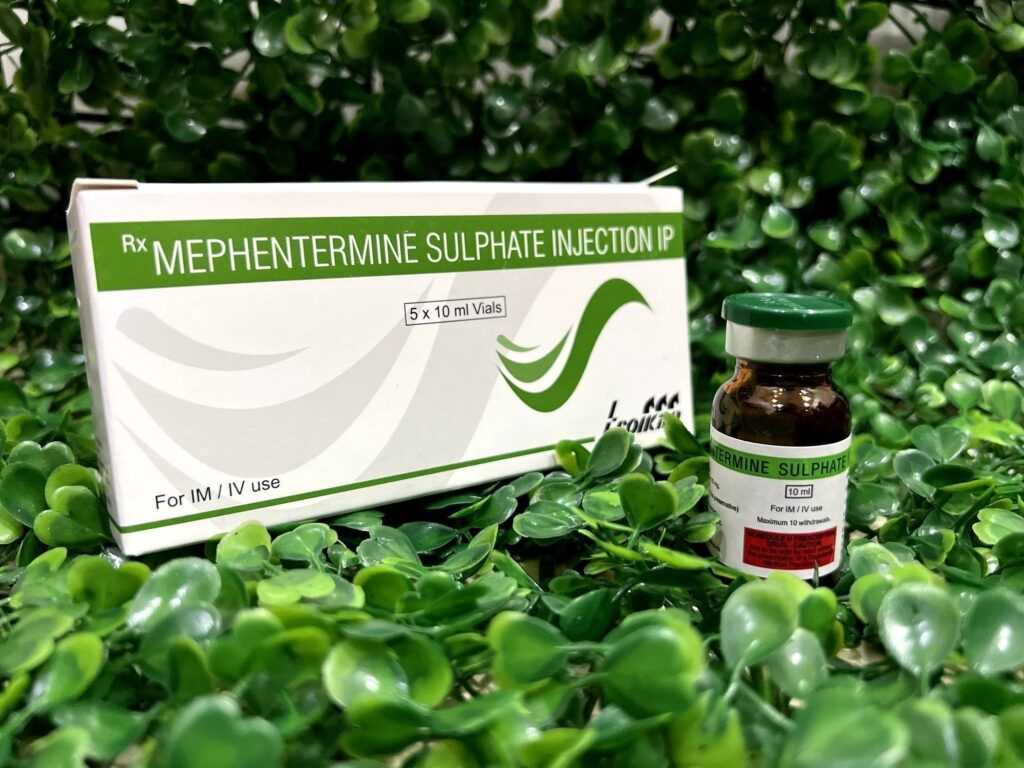
Termin injection is used to normalise decreased blood pressure (hypotension) which may occur due to administration of anaesthesia in the spine during an operation. This medicine helps to bring back the blood pressure within normal range and therefore prevents any sudden fall or even serious complications that might have otherwise followed due to low blood pressure.
It is available as an oral tablet and IM or IV injection. The onset of action is prompt (within 5 to 15 mins) and the duration of action lasts up to 4 hours after IM injection. It’s available as 10mg oral tablets and also as intramuscular or intravenous injections of 15-30mg/ml. The standard therapeutic dose range is 15-60mg/d as an intravenous injection.
Some side effects include: fear, insomnia, tremors, nausea, urinary retention, psychosis, restlessness, anxiety, confusion, irritability, reduced appetite, weakness etc.
Sympathomimetic drugs mimic the stimulation of the sympathetic nervous system. They form a classification of medication used to manage hypotension, hypertension, heart failure, COPD, glaucoma, nasal congestion, premature labour, attention-deficit/hyperactivity disorder, narcolepsy, and acute or chronic asthma.
Acc. to studies, just like amphetamines, it has also been shown to increase athletic performance in strength exercises and endurance in a dose of 14mg/70kg body weight. Mephentermine is a stimulant whose use is prohibited by the World Anti-Doping Agency (WADA).
However, there are many case reports that it is being misused for its stimulant-like properties. Young people are misusing this substance for the purpose of better physical performance in competitive sports or bodybuilding.
Below are some of the Indian case studies:
Case 1: “Mr X a 26 year old married male who is a competitive bodybuilder by profession hailing from urban area of Telangana state with no past history of mental illness and history of mental illness in paternal grandfather presented to Retreat hospital, Hyderabad in the month of November 2020.
He reports occasional use of alcohol with friends starting at the age of 18 years and no history of smoking or other substance use. He took body building as a profession at 19 years of age, initially he tried naturally as there was no progress, on advice of the senior trainers he started using anabolic steroids regularly for gaining muscle mass following which he had won three district and one state level medals at the age of 24 years.
Later in October 2019 he decided to train in calisthenics for which the required body fat should be under 10%. In order to attain that, with advice of his senior trainers he started Mephentermine which he procured from local pharmacy. Initially he used to get administered by his friend who works in nearby hospital as male nurse and later on learnt himself when frequency increased.
Following the first IV dose he perceived increased energy, endurance, pleasurable sensation, nerve stimulation, and increased boost for exercise. He started at the dose of 75mg per day which is a prescription dose among trainers in three divided doses intravenous for almost 4 months. In this duration he reports loss of appetite, impaired sleep, emotional dysregulation and occasionally suspiciousness towards wife. There were no withdrawal symptoms reported in this duration even with dose reduction.
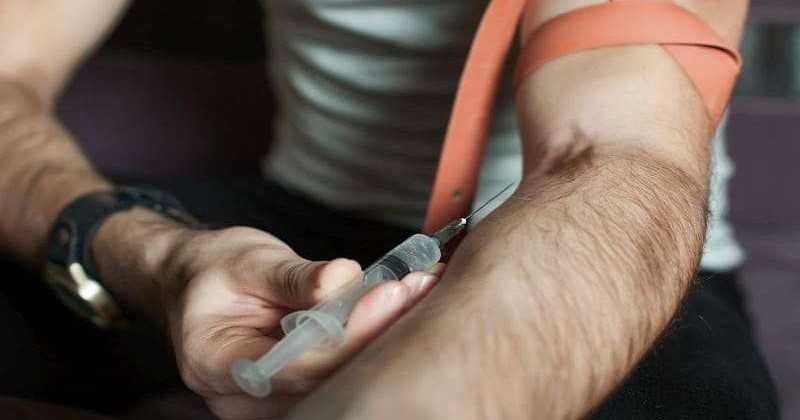
He stopped going to other works and spent all his money to procure the drug, he used to lend money from his friends if he doesn’t have enough money later sought money from local sponsors. He increased the dose to 100-120mg/day gradually. He developed more suspiciousness, sleep impairment, irritability, auditory hallucinations, visual hallucinations and suicidal ideations.
On 11th November 2020 he had a quarrel with wife and attempted suicide by taking almost 500-600mg intravenous Mephentermine in single dose due to which he developed severe restlessness, auditory and visual hallucinations. He realized that his suicide attempt failed so he jumped from a two storied building and was presented to the emergency room. On examination he was conscious and oriented, abrasions were seen on right arm and multiple needle puncture wounds on both arms.”
Case 2: “A 24-year-old male presented with sudden onset of behavioural abnormalities 5 hours following intravenous use of Mephentermine to boost his athletic performance. During the event, he could run for 5 km while many of his fellow participants gave up midway. But after running for 5kms, he suddenly started to behave abnormally. He became very agitated and extremely restless. He started talking irrelevantly. He physically assaulted the selection personnel and bit the Medical Officer with the army when brought for a physical check-up. So he was brought by the Army for treatment at the Psychiatry Ward.
On his arrival at the Psychiatry OPD, he was in a very irritable mood. He was brought physically restrained but was still screaming and he could not be controlled by 5-6 strong Army men. He was extremely aggressive and did not answer any of the questions by the interviewer. On physical examination, tachycardia of 140 bpm, elevated BP of 150/90 mmHg and bilaterally dilated pupils were found. He was sweating profusely. Some prick marks were found on his forearms.
On awakening after 4 hours, he was oriented to time, place and person. Initially, he denied having used any substance but he later confided to having used Injection Mephentermine intravenously in the morning before his performance to increase his stamina. He did not reveal the amount he used. He denied having used it before so dependence could not be established. He claimed to have heard about this substance and its ability to boost performance from his friends at the gym.”
Case 3: “Mr. Z is a 38-year-old married Muslim male, formerly a manual labourer, educated till 10th standard, presented to the Outpatient Department, brought by a close friend. He was actively involved in bodybuilding and athletics, primarily the sport of tug-of-war. He complained of racing thoughts, distractibility, being increasingly irritable all the time, forgetfulness and “getting carried away with whatever he was doing” for the past three months.
The friend confirmed this and reported that he was excessively talkative, always irritable, getting angry, and picking fights at the slightest provocation. He was overfamiliar with individuals, starting arguments with persons with whom he was not personally acquainted, even those in positions of authority. As a result of these behaviours, he was dismissed from his job a month back.
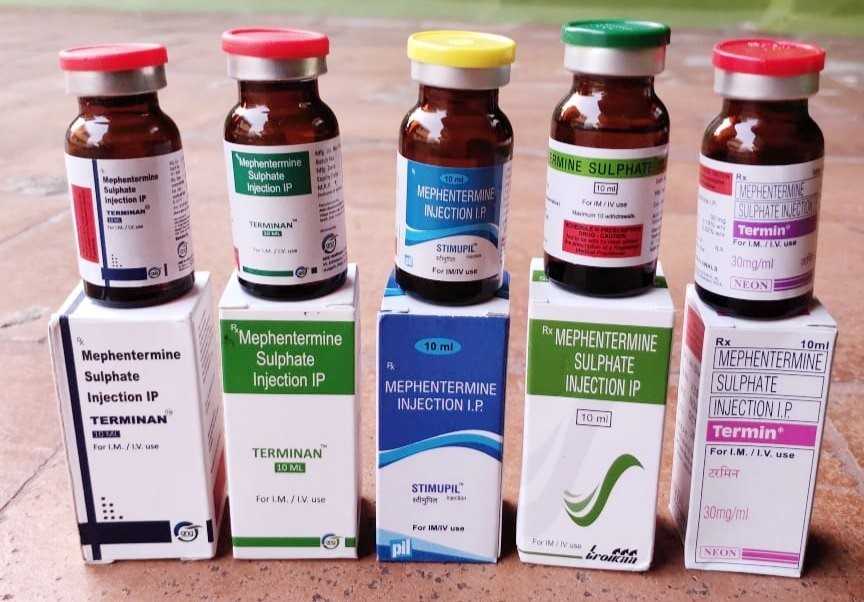
The patient denied that the problems had been that severe, although he admitted that his behaviour now was different and that he would not have done this before. He also reported a decreased need for sleep, with a constant need to be engaged in activities, and significantly increased libido and sexual activity with his wife, which he acknowledged was causing difficulties for his wife and impairment in their marital relationship.
Further, on a detailed assessment of history, the patient revealed that he had been regularly using intravenous mephentermine for the past three years. He was initially introduced to the substance by his sports teammate, who claimed that it would boost his performance. He reported that he had increased strength and vigour after using it, felt less exhausted than before from doing the same activities and performed better in sports.
He quickly began using it for the perceived benefits on a daily basis, starting at 5ml per day of 30mg/ml solution. This progressed over the course of three years to a usage pattern of around 20ml/day (600mg/day) of the same solution, as he could no longer achieve the same effect with the smaller dose.
He had an intense craving for the substance and would self-medicate with it when stressed, claiming it helped relieve his stress. He occasionally thought about cutting down on the substance but was ultimately unsuccessful in doing so and never seriously attempted abstinence. He complained of feeling weak, restless, and anxious whenever the dose was reduced.”
Case 4: “A 35 years old married male, matriculate from rural area belonging to middle income group reported to Psychiatry department of Government Medical College, Patiala with history of administration of injection Mephentermine for last four years with marked aggressive and violent behaviour. Patient was a kabaddi player since 2005 and represented a town club. In 2012, he shifted to another club, where he was introduced to injection Mephentermine by his coach to enhance his performance and suggested that it was used by most of the players in the team.
Initially, it was being procured and administered by his coach in a dose of 15mg daily intramuscularly which reached to a dose of 90mg in about two months. In a span of one year, he started purchasing Mephentermine on his own and self-injecting 900mg daily in 6 divided doses. He was advised against using such high amount of Mephentermine by his fellow players and coach but he was unable to cut down the dose as he felt intense craving, restlessness and lassitude.

Gradually, there was increased aggressiveness in his behaviour and he had frequent verbal spats with other players and his family members over trivial issues. In 2013, he was dropped from the team on disciplinary grounds. He developed suspiciousness towards his teammates that they were conspiring against him and they would kill him. Once he jumped out of running train sustaining serious injuries on suspicion that he was being followed.
When he was brought to our department, he was consuming 1200mg of Mephentermine daily for the preceding 8 months. On general examination, there were multiple injection marks over his both forearms and lateral aspect of both thighs.
On mental state examination, he appeared aggressive but apprehensive. He had delusions of reference and persecution. He reported hearing of threatening voices suggestive of auditory hallucinations.”
Case 5: “A 32 years old male presented to the drug addiction OPD and treatment centre of the Institute of Human Behaviour and Allied Sciences, Delhi for withdrawal symptoms of mephentermine. Mephentermine was advised by his gym trainer as intravenous (IV) mephentermine to increase his endurance.
Following an IV dose administered, he perceived increase energy, endurance, pleasurable sensation, nerve stimulation, and increase boost for exercise. After irregular use (30-60mg 2-3 times weekly) for 4-5 months, he gradually increased the dose from 30mg to 60mg IV daily regularly.
On voluntary dose reduction, he experienced withdrawal features like body ache, numbness, restlessness, cold extremities and intense craving, and lack of interest in routine life which convince him to seek medical help and consultation. Aware of the dependence, he often thought of and occasionally tried to stop mephentermine use (longest attempts 3-4 days) but failed due to strong craving.
Clinical examination revealed evidence of injection abuse in the form of multiple injection site-related skin infection on fore-arm and hips with a history of pus drainage from the injection site.”
Case 6: “A 25-year-old male, bank employee by profession, working as a part-time gymnasium instructor, residing in Mumbai, was brought to our outpatient department by his father. He complained of irritability, aggression, and insomnia with ongoing abuse of injectable mephentermine sulfate over the last 2 years.
The father mentioned that the patient was introduced to mephentermine by friends 2 years ago who advised him to take it to improve his stamina and physique. The patient took 30mg of mephentermine intramuscularly following which he felt energetic and was able to exercise better. The patient gradually increased the dose to 900mg/day.
The father noticed marked change in his behaviour. He would barely sleep for 3–4h at night, get increasingly irritable, and engage in altercations with family and friends on trivial issues, later repenting. In one instance following a prank played by one of his friends, the patient got so enraged that he broke into his house and assaulted him till four adult men forcibly restrained him.

Unable to control him, the police were called who took him to a mental health facility where he was admitted; details of treatment were not available, however. He remained abstinent for the next 6–7 months, with marked improvement in his behaviour. He restarted mephentermine without the knowledge of his family members, gradually increasing the dose to 900mg/day.
On further interview, the patient and father denied any other substance use or psychiatric illness. His premorbid personality was quick tempered, emotionally labile, extrovert, and impulsive. He was the eldest of three siblings and had no family history of mental illness.
On general examination, he was well built, weighing 70kg with multiple puncture marks, and skin discoloration over both his deltoid and gluteal region. His vital parameters were normal. He denied any delusions, death wishes, or suicidal ideations but expressed a craving for the injectable; he denied perceptual abnormality in any sensory modality.”
Case 7: “A man aged 26 (unmarried, only child, living with his parents) presented to the Drug De‐addiction and Treatment Centre at the Post Graduate Institute of Medical Education and Research, Chandigarh, India in late 2011. He reported occasional use of tobacco, cannabis, and alcohol in high school, followed by dextropropoxyphene 65mg capsules in 2003.
By 2005, depending on the availability, he was using up to 15 capsules daily, and opium, poppy husk, codeine containing cough syrups or diphenoxylate tablets as substitutes. Dose reduction resulted in withdrawal features like lacrimation, rhinorrhoea, body aches, and intense craving. For lack of interest, he discontinued studies, and loafed around or did a few petty jobs. He lost all such jobs within a month due to intoxication at work.
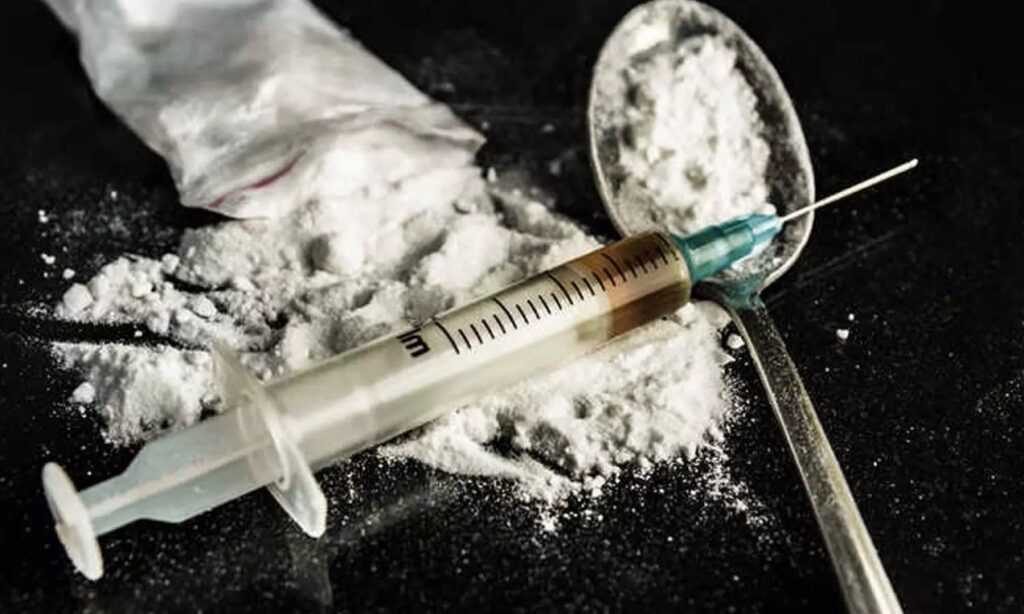
In 2009, when his father became aware of his opioid dependence and threatened stopping his pocket money, he quit opioids. For his opioid withdrawal a local chemist recommended mephentermine, highlighting its performance enhancing use by sportsmen. The first intravenous dose of 30mg made him feel energetic and stimulated.
Two days later a double dose made him feel even better. Thereafter, he continued self‐injecting 60–90mg 2–3 times weekly, while abstaining from opioids. He found mephentermine preferable over opioids as he could get a “high” without appearing to be intoxicated to others, especially his father.
Six months later, he was taking mephentermine injections daily, in gradually escalating doses. Procuring it was costing him 2–3 times more than his expenses on opioids. He denied any illegal or criminal activity, but owned up lying and stealing at home. Feigning physical symptoms, he sought money for medical consultations.
Failure to procure mephentermine would result in withdrawal symptoms like lassitude, restlessness, and cold extremities, which would convince his father of the need for medical help. He avoided letting his father accompany him to the medical consultations. Aware of the dependence, he often thought of and occasionally tried to stop mephentermine use (longest attempt lasting 1 month), but failed due to strong craving.
By mid 2011, mephentermine use had become too expensive and prevented his gainful employment. He divulged the problem to his father. A local deaddiction centre pleaded ignorance of managing mephentermine dependence. Dejected and fearing for his son’s life on abrupt cessation, the father now procured the mephentermine. When they contacted us, he had been using intravenous mephentermine 1500mg/day in 4–5 divided doses for the preceding 6 months.”
Case 8: “A 26-year-old man presented to psychiatry outpatient services of this tertiary care hospital with regular use of and inability to stop injection Termin (mephentermine) for last 3 years. Background information and history was explored.
Since his school days, the patient has been interested in athletics and had a passion for running. He had won several racing competitions held during intraschool and interschool sports competitions. He progressed in his athletic career and participated in national-level championships as well. However, he could not achieve more accolades.
After completing 12 years of formal education, he did not pursue undergraduate courses. By the age of 22 years, he could secure a clerical job under state government through a special privilege available to sportsmen. He joined the same. However, his passion for running did not die and he continued to participate in various local and regional competitions. It was during this time, at an age of 23 years, he was introduced to mephentermine injections by a fellow athlete.

He was informed by his fellow athlete that he could easily gain significant improvement in his performance by use of this injection. He was initially reluctant to use mephentermine as he had never used any drug to augment his physical capabilities. However, he could not resist peer pressure and used the injection.
At first instance, his peer injected 30mg mephentermine in his arm (deltoid muscle of arm). After around half-an hour, he felt significantly energetic. He felt that he could run faster and for longer duration without getting any sense of fatigue or tiredness. He used this drug in same dose once a week for next 1 month. Thereafter, he learnt to administer injections himself (intramuscular).
The frequency of taking injections also increased to two to three times every week. By end of around 6 months, he shifted to intravenous use as it produced physical effects quickly and also produced a sense of psychological well-being and peace of mind. After a year and half, he was taking multiple mephentermine injections in a day and his cumulative daily dose could be anything between 600 and 700mg.
During all this period, he never tried to return to professional athletic competitions but still continued to use mephentermine injections. Any attempt to decrease the dose or to discontinue the injections led to significant drowsiness, fatigue, cold and numb limbs and restlessness. These symptoms were relieved only after taking mephentermine injections. He always used fresh needles and syringes for taking injections. He had never shared needles or syringes with anyone. He always wore full sleeve shirts in order to hide scars due to repeated injections.
At the age of around 25 years, he got married. He could not hide his problem from his wife for long. His wife motivated him to abstain from use of his drug. He expressed his difficulty in doing the same. She advised him to seek medical help for the same which he refused and decided to make a strong attempt to gradually discontinue mephentermine use.
Over next 1 year, with much difficulty, he could bring down the daily dose of mephentermine to 300mg. Despite his continued effort, he could not decrease the dose further. It was at this point of time that he agreed to seek medical advice.”
Case 9: “A 32-year-old professional bodybuilder presented with acute decompensated heart failure. He gave a history of anabolic androgenic steroids (AAS) use for >2 years and mephentermine use for the preceding 3 months. Echocardiography showed severe left ventricular (LV) dysfunction. The patient had an embolic stroke during the hospital stay, with complete neurological recovery. Following the cessation of mephentermine use, there was a steady improvement in LV function over a follow-up of 2 months. However, at 3 months, his ventricular function showed deterioration, which coincided with mephentermine reuse.”
There have also been multiple cases of arrests of people selling illegal Mephentermine along with other drugs:
- Case 1: Pune, pimpri: A police investigation uncovered a disturbing trend where college students, both girls and boys, are misusing Mephentermine Sulphate injections, to enhance sexual performance and engage in more strenuous workouts at the gym. The Anti-Extortion Squad of Pimpri-Chinchwad police apprehended Ravi Thapa, who was found in possession of 600gm of ganja and 95 bottles of Mephentermine Sulphate Injection.
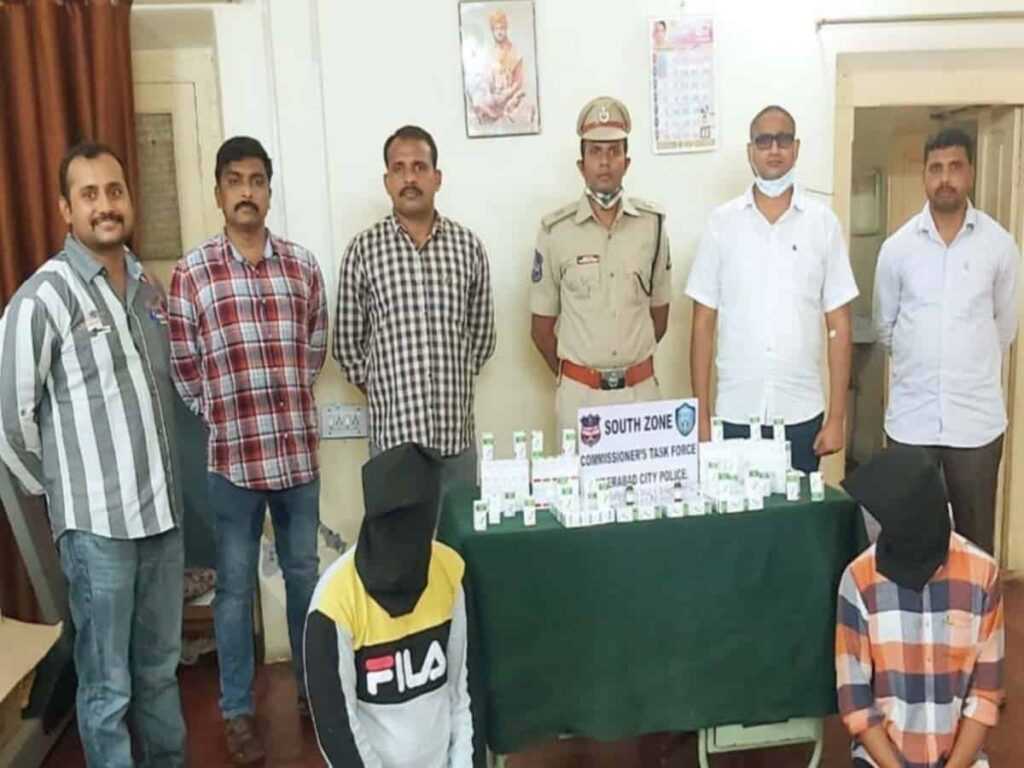
- Case 2: Hyderabad, Telangana: Hyderabad police seize 188 Mephentermine Sulphate injections from a gym in Cyberabad & a businessman.
- Case 3: Hyderabad, Telangana: the drug control department officials raided a gym in Myladevarapalli, and seized 400 Mephentermine Sulphate injections, and arrested 3 people. One was a gym trainer and other two were his friends.
- Case 4: Pune: FDA officials seized 246 vials of Mephentermine Sulphate injections. The suspect was selling the injections to nearby gyms.



